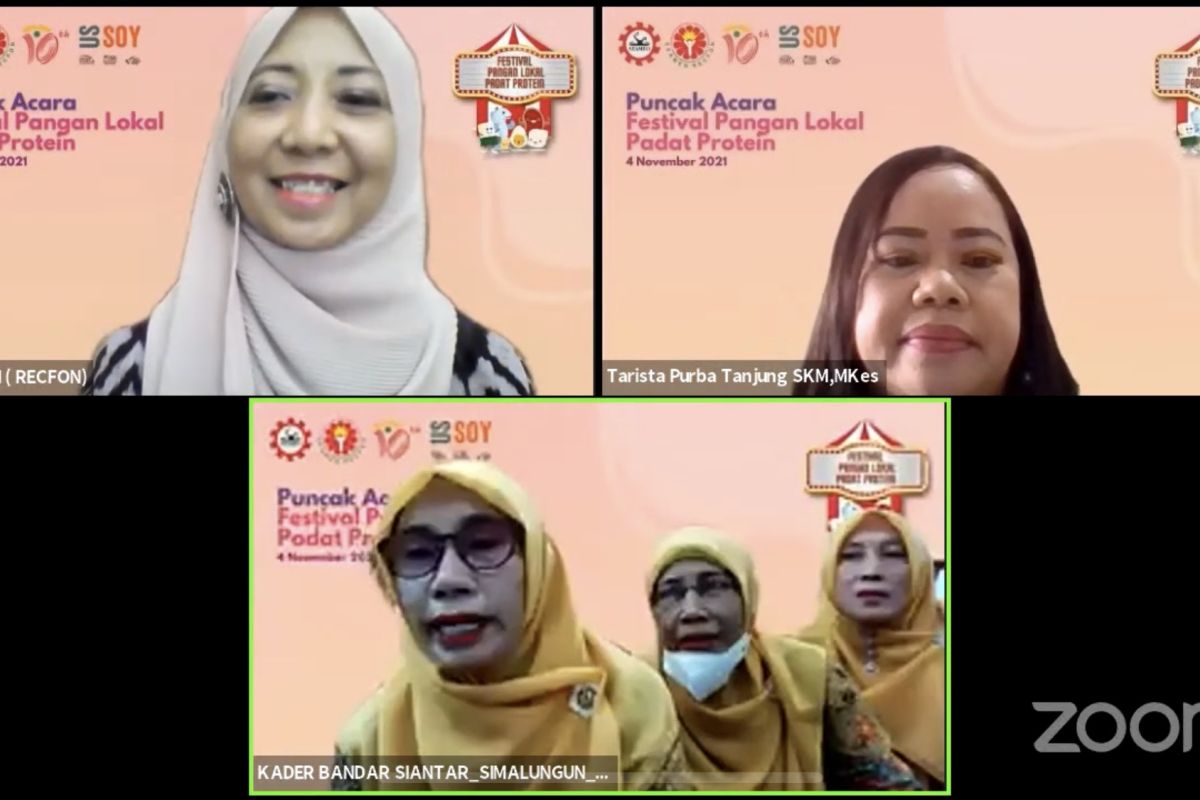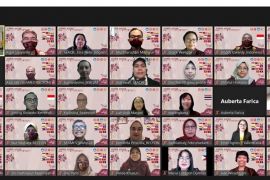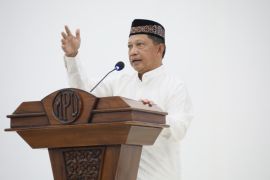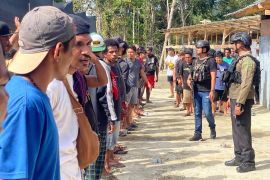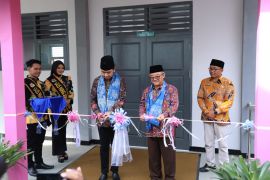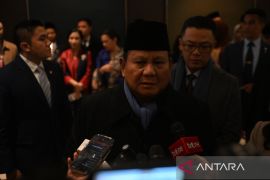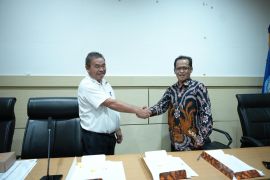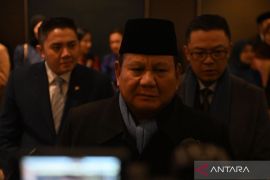Jakarta (ANTARA) - With tears of happiness, the health cadre from Nagari Bandar Siantar in Simalungun, North Sumatera, slowly share her experience “We did not expect that we would become champions, but we have worked hard to give our best in introducing protein-dense menus to our fellow cadres and to mothers in our area in an effort to prevent and overcome stunting in our area.”
Her heartwarming statement was revealed during her announcement as one of the winners of the tempe recipe creation competition held by SEAMEO RECFON in Simalungun, North Sumatera. This competition was participated by 100 Early Childhood Educators and posyandu (Health Posts) cadres, most of them are women. Last October, in a group of 5 people, the creativity of the educators and cadres was tested to create new recipes that were suitable and acceptable for children, using tempeh as the basic ingredient. Tempeh is a unique fermented soy product consumed throughout Indonesia, especially among the Javanese. It is known to contain high protein, even higher than beef. “The competition made us realize that protein doesn't have to be expensive, but it should be in every meal," added the lady cadre from Simalungun.
Besides Simalungun, similar competitions were held in 2 other districts in Indonesia: Tanjung Jabung Timur in Jambi and Maros in South Sulawesi. In each regency, more than 100 participants were competing. The creative recipe competition is part of the Southeast Asian Ministers of Education Organization – Regional Center for Food and Nutrition (SEAMEO RECFON) in supporting stunting alleviation efforts in Indonesia. The organization is one of the 26 regional centers of excellence of the Southeast Asian Ministers of Education Organization (SEAMEO), an intergovernmental organization established in 1965 among governments of Southeast Asian to promote regional cooperation in education, science, and culture in the region.
Using the Linear Programming Optifood (LP-Optifood) software provided by WHO in 2020, SEAMEO RECFON has developed Local Specific Food-based Recommendation (LSFBR) or Panduan Gizi Seimbang Berbasis Pangan Lokal (PGSPL) for infants and toddlers for 50 stunting priority districts throughout Indonesia. The compilation of nutritional needs of each district and development of LSFBR was carried out by utilizing the Nutrition Consumption Monitoring Survey data conducted by the Indonesian Ministry of Health in 2016. Local academics from health polytechnics and universities in six regions in Indonesia were tapped for data analysis and formulation of LSFBR.
The analysis of toddlers’ diet intake showed that the majority of the stunting priority districts in Indonesia have on average 1-2 nutrients problems and 1-3 inadequate nutrients diets. Fortunately, nutrient-dense foods that have the potential to increase the adequacy of specific problematic nutrient intake can be found in local animal and vegetable protein sources. The intake can also be increased by processing food sources using local recipes or composite menus of nutrient-dense food. Among the vegetable protein sources recommended by the LSFBR, Tempeh is included as an important part of the menu.
Thus, to increase the potential of local protein, this protein campaign was initiated. This time, SEAMEO RECFON received support from US Soybean Export Council (USSEC) and 3 academic partners from the Medan Health Ministry Polytechnic, the Ministry of Health Poltekkes Makassar, and Jambi University.
In September and October 2021, they held a series of webinars with the aim to raise awareness on the Local Protein Consumption Campaign for Stunting Alleviation in Indonesia. The webinars were held in 3 provinces, namely North Sumatra, Jambi, and South Sulawesi. In total, there were nine webinars, which were attended by more than 2500 participants, consisting in total of around 1300 academia and policy makers, more than 1000 high school students and more than 300 members of local women organizations. The participants came not only from the 3 provinces, but also other provinces in Indonesia.
Using the webinar method has expanded access for people outside the 3 provinces to attend the webinars. In addition, the method has also given wider exposure to academics and policy makers in North Sumatra, Jambi and South Sulawesi who act as resource persons. This is an important form of acknowledgment of the work that has been done by the local food and nutrition experts. Three local experts were even granted the title as local food figures and are expected to become ambassadors for the promotion of local protein in their respective regions. They are Prof. Dr. Posman Sibuea, PhD from Catholic University of Santo Thomas Medan, North Sumatra; Dr. Suryono, M.Si from Faculty of Animal Science, Jambi University, Jambi Province; and Prof. dr. Veni Hadju from Faculty of Public Health, Hasanuddin University, South Sulawesi. The awarding event was also carried out through an online platform in early November 2021.
“I am very touched. We will certainly be more motivated (by this award) to further help Jambi Province in promoting local protein as one of the solutions for stunting alleviation,” said Dr. Suryono M.Si.
To fuel the curiosity and awareness of millennials and generation Z, a Social Media Content Creation competition was also held. This competition received great enthusiasm from Indonesian netizens by attracting content submissions of 288 images and 160 videos from the student category; as well as 180 image and 99 video content from general categories. The participants came from all over Indonesia and the majority were Instagram users.
“I am very grateful and very happy to be selected as 1st place in the video-general category. Alhamdulillah, my video was chosen and insha Allah can be a contribution to socialize the importance of this stunting issue. Hopefully, viewers who watch my video can get education about stunting and how to prevent it, especially in the family environment,” said Nasty Lauri, S.Pd who works as a housewife.
Realizing the important role of electronic and print media, in each event, the committee ensures that there is wide coverage on news channels, especially from local news agencies. At least 30 local news stories were produced during the campaign period. In addition, in cooperation with radio broadcasting offices, radio broadcasts were relayed through local radios in the provinces of North Sumatra, Jambi and South Sulawesi. This radio broadcast received positive feedback from viewers, especially on the topic of stunting and the role of tempeh as a local food.
"As a public health practitioner, I have learned a lot from this series of campaign activities," comments Grace Wangge, campaign coordinator from SEAMEO RECFON. "So far, we have conducted many educational activities on stunting and the role of local food, especially local protein, but it seems that other efforts, including the massive engagement of the community and regional leaders, will give a greater boost to public health campaign activity."
This protein campaign was chosen to be started in 3 provinces outside Java to intensify local food promotion activities in various regions in Indonesia. In the future, it is expected that the activities that have been initiated can also be rolled out to other provinces in Indonesia. A special website proteinlokal.net was built and maintained by SEAMEO RECFON as the initial platform for further expansion of this activity in the future.
Reporter: PR Wire
Editor: PR Wire
Copyright © ANTARA 2021
